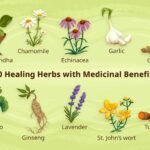Regulation and Certification in Botanical Medicine
Botanical medicine, or herbal medicine, plays a significant role in natural healthcare, offering remedies derived from plants for various ailments. As the use of plant-based therapies grows, it becomes essential to establish clear regulations and certification processes to ensure quality, safety, and efficacy. In this post, we’ll explore the importance of regulation and certification in botanical medicine and how these practices help protect both consumers and practitioners.

1. Importance of Regulation in Botanical Medicine
Regulation in botanical medicine ensures that herbal products meet safety and quality standards. Since botanical medicines often come in various forms—such as capsules, tinctures, teas, and oils—ensuring that these products are free from contaminants and accurately labeled is essential for consumer protection. Regulations help prevent the sale of substandard or unsafe products, which could potentially harm individuals or worsen their health conditions. Regulatory bodies also assess the efficacy of botanical remedies, ensuring that claims made by manufacturers align with scientific evidence. These regulations help maintain public trust in herbal products, providing consumers with the confidence that the products they purchase are safe and effective.
2. Certification Process for Herbal Practitioners
Certification of herbal practitioners is another vital aspect of botanical medicine. It ensures that practitioners have the necessary knowledge and skills to safely and effectively recommend and use herbal remedies. Various organizations, such as the American Herbalists Guild (AHG), offer certification programs for aspiring herbalists. These programs usually require a combination of formal education, practical experience, and examinations. Certification also holds practitioners accountable for their practices, ensuring that they adhere to ethical standards and maintain up-to-date knowledge of botanical medicine. A certified herbalist demonstrates their commitment to ongoing learning and professional growth, fostering trust with their clients.
3. Regulatory Bodies and Their Role
Several regulatory bodies govern the use of botanical medicines worldwide, ensuring their safety and efficacy. In the United States, the Food and Drug Administration (FDA) regulates herbal supplements under the Dietary Supplement Health and Education Act (DSHEA). However, it does not approve supplements before they enter the market. Instead, the responsibility lies with manufacturers to ensure their products are safe and accurately labeled. Additionally, the American Botanical Council (ABC) provides valuable resources for both practitioners and consumers, including the “Botanical Safety Handbook,” which outlines safe usage guidelines for various herbs. In Europe, the European Medicines Agency (EMA) plays a similar role, regulating herbal medicines and ensuring their quality.
4. Challenges in Botanical Medicine Regulation
One of the primary challenges in regulating botanical medicine is the lack of standardization. Unlike pharmaceutical drugs, botanical products often vary in composition due to differences in plant growing conditions, harvesting methods, and extraction processes. This variation can affect the potency and effectiveness of herbal remedies, making it difficult to establish universal safety and efficacy standards. Furthermore, as the popularity of herbal medicine increases, so does the market for unregulated products. Many herbal remedies are sold as dietary supplements, which often don’t undergo the rigorous testing and approval processes required for pharmaceuticals. The lack of oversight can result in unsafe products being sold to consumers.
The Importance of Play and Mental Relaxation
Modern life is often fast-paced and demanding, leading to chronic stress that can disrupt our inner balance. Traditional wellness practices often emphasize the need for periods of rest and light-hearted activity to counteract this. Engaging in activities that are purely for enjoyment can be a powerful remedy for a tired mind. This could be a walk in nature, a creative hobby, or even some light entertainment. Taking a break with enjoyable activities, like engaging with online casino games, can provide a necessary mental diversion, allowing for a state of play and relaxation that is crucial for cognitive health and stress reduction. The goal is to find a healthy escape that allows your mind to rest and recharge.
5. Benefits of Proper Regulation and Certification
Proper regulation and certification in botanical medicine offer significant benefits to both consumers and practitioners. For consumers, it ensures that the products they purchase are safe, effective, and accurately labeled. Regulation also helps prevent the misuse of plants that may cause harm or lead to adverse effects when used improperly. For herbal practitioners, certification promotes professionalism, credibility, and a commitment to best practices. By adhering to established standards, certified herbalists can offer clients well-researched, effective remedies that enhance their health. Additionally, regulation and certification help protect the integrity of the herbal medicine industry, ensuring that it continues to grow and thrive in a responsible manner.
Conclusion
Regulation and certification are essential components of botanical medicine, ensuring that herbal remedies are both safe and effective for consumers. While regulatory bodies work to establish safety standards and guidelines, certification for herbal practitioners helps ensure professionalism and accountability within the field. Despite the challenges involved in standardizing plant-based therapies, the benefits of regulation and certification are clear. They protect consumers, promote ethical practices, and help maintain the integrity of the botanical medicine industry, fostering confidence in its use as a natural healing option.



